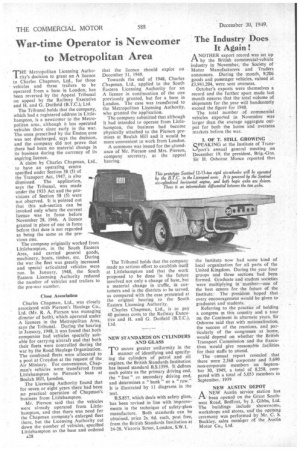War-time Operator is Newcomer to Metropolitan Area
Page 30

If you've noticed an error in this article please click here to report it so we can fix it.
THE Metropolitan Licensing Autho rity's decision to grant an A licence to Charles Chapman, Ltd., for three vehicles and three trailers to be operated from a base in London, has been reversed by the Appeal Tribunal on appeal by the Railway Executive and H. and G. Dutfield (B.T.C.), Ltd.
The Tribunal holds that the company, which had a registered address in Littlehampton, is a newcomer to the Metropolitan area, although it has operated vehicles there since early in the war. The onus prescribed by the Enston case was not discharged, says the decision, and thecompany did not prove that there had been no material change in its business during the currency of its expiring licence.
A' claim by Charles Chapman, Ltd., to have an operating centre specified under Section 58 (5) of the Transport Act, 1947, is also dismissed. The application, says the Tribunal, was made under the 1933 Act and the provisions of Section 58 (5) were not observed. It is pointed out that this sub-section can be invoked only where the current licence was in force before November 28, 1946. A licence granted in place of one in force before that date is not regarded as being the same as the previous one.
The company originally worked from Littlehampton, in the South Eastern Area, and carried general goods, machinery,• boats, timber, etc. During the war the fleet was greatly increased and special articulated vehicles were run. In January, 1948, , the South Eastern Licensing Authority reduced the number of vehicles and trailers to the pre-war number.
Close Association
Charles Chapman, Ltd., was closely associated with Pierson's Haulage Co., Ltd. (Mr. R. A. Pierson was managing director of both), which operated under A licences in the Metropolitan Area, says the Tribunal. During the hearing in January, 1948, it was found that both companies had vehicles specially suitable for carrying aircraft and that both their fleets were controlled during the war by the Road Haulage Organization. The combined fleets were allocated to a pool at Croydon at the request of the Air Ministry. For convenience, Chapman's vehicles were transferred from Littlehampton to Pierson's base at Beulah Hill, London.
The Licensing Authority found that for seven or eight years there had been no practical operation of Chapman's business From Littlehampton.
Mr. Pierson said that the vehicles were already operated from Littlehampton, and that there was need for the Chapman company's enlarged fleet there, but the Licensing Authority cut down the number of vehicles, specified Littlehampton as the base and ordered a2g that the licence should expire on December 31, 1949.
Towards the end of 1948, Charles Chapman, Ltd., applied to the South Eastern Licensing Authority for an A licence in continuation of the one previously granted, but for a base in London. The case was transferred to the Metropolitan Licensing Authority, who granted the application.
The company submitted that although it had intended to operate from Littlehampton, the business had become physically attached to the Pierson premises at Beulah Hill and it would be more convenient to work from London.
A summons was issued for the attendance of Mr. Pierson and Mrs. Pierson, company secretary, at the appeal hearing.
The Tribunal holds that the company made no serious effort to establish itself at Littlehampton and that the work proposed to be done in the future involved not only a change of base,,but a material change in traffic, in customers and in the districts to be served, as compared with the case presented at the original hearing to the South Eastern Licensing Authority.
Charles Chapman, Ltd., is to pay 40 guineas costs to the Railway Executive and H. and G. Dutfield (B.T.C.), Ltd.
NEW STANDARDS ON CYLINDERS AND GLASS
TO secure greater uniformity in the manner of identifying and specifying the cylinders of petrol and oil engines, the British Standards Institution has issued standard B.S.1599. It defines such points as the primary driving end, the " free " or secondary driving end, and determines a " bank " or a "row." It is illustrated by 11 diagrams in the text.
B.S.857, which deals with safety glass, has been revised in line with improvements in the technique of safety-glass manufacture. Both standards can be obtained, price 2s. 6d. each, post free, from the British Standards Institution at 24-28, Victoria Street, London, S.W.1.




















































































